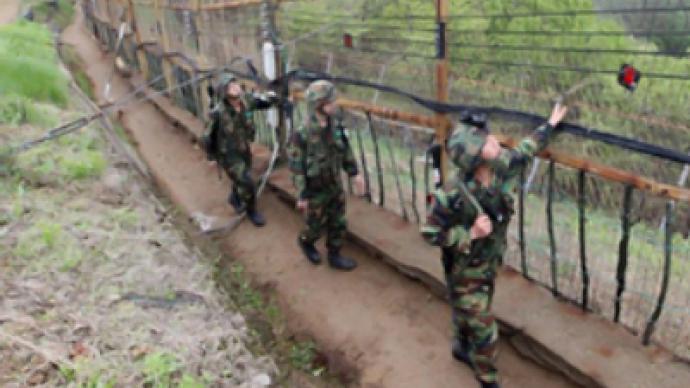US, Russia contemplate Korean crisis

The US is demanding action, Russia is calling for calm, and North Korea is threatening retaliation if actions are taken against Pyongyang over the sinking of a South Korean warship.
A six-week-long investigation, made up of an international team of investigators, proved what many had feared from the beginning: that a submarine belonging to North Korea was responsible for sinking the Cheonan, a South Korean naval ship that was carrying a crew of 104 off the coast of North Korea on March 26, 2010.
Forty-six South Korean sailors lost their lives in the blast, and now tensions between the two states are at their highest point in many years.
Background to the crisis
The sinking of the Cheonan occurred near Baengnyeong Island in the Yellow Sea, which is less than 10 miles (16 km) from the North Korean coast and over 100 miles (160 km) from South Korean territory.
Although the island is beyond the so-called Northern Limit Line – the boundary separating North Korea from South Korea – Pyongyang lays claim to the sea surrounding Baengnyeong, and more importantly (especially considering the North’s shattered economy) the rich fishing opportunities that the waters offer.
The sinking of the South Korean warship marks the high point in a long history of skirmishes in these militarily and economically contested waters.
On May 20, the international investigation team (made up of investigators from Australia, Canada, South Korea, Sweden, the US and UK) released their report in which they concluded that the sinking of the South Korean naval vessel was the result of a North Korean torpedo launch, saying that, “The evidence points overwhelmingly to the conclusion that the torpedo was fired by a North Korean submarine.”
North Korea responded harshly to the accusations, saying it would withdraw from a nonaggression pact with South Korea, as well as sever all diplomatic and economic ties if Seoul continued to pursue its claims.
Technically speaking, North and South Korea are still at war, as their 1950-1953 conflict, which saw the involvement of US soldiers, only ended in an armistice. Today, international efforts to stop Pyongyang's controversial nuclear weapons and ballistic missile development programs have moved forward in fits and starts, and completely broke down last April when Pyongyang walked out of the negotiations – involving Russia, Japan, China and the United States – in protest against the United Nations' condemnation of its missile tests.
Russia’s response
Russian President Dmitry Medvedev on Tuesday called on his South Korean counterpart to show restraint and not allow the situation with North Korea, which shares a tiny northern border with Russia, to escalate, the Kremlin press service said.
Medvedev spoke with President Lee Myung-bak by telephone about the heightened tensions between Seoul and Pyongyang.
“Both leaders have expressed regret that a number of important inter-Korean projects in the trade and economic spheres, which were drawn up with Russian help several years ago, have not been implemented, and that the general situation has deteriorated to the level of confrontation,” the statement read.
The two presidents confirmed their commitment to continue consultations on all matters relating to the Korean Peninsula.
Meanwhile, troops in the Russian Far East have not been put on high alert following the crisis between North and South Korea, several military officials said on Wednesday.
“We have not received any orders from Moscow to put the Pacific Fleet on high alert due to the conflict between the two Koreas. The fleet is currently carrying out scheduled exercises at sea and on land,” a Pacific Fleet spokesman announced on Wednesday.
The official added that the arrival of Russia's most powerful warships in the Pacific had been scheduled long ago as part of the biennial Vostok strategic exercises and was not related to the crisis on the Korean Peninsula.
His statement was supported by officials representing Russia’s ground forces and air defenses in the Far East.
“The troops are involved in their regular summer training,” a spokesman for the military district told reporters. “The units of the Far Eastern military district have not received any high alert orders.”
Meanwhile, a number of Russian analysts are suggesting that Moscow and Beijing could be the most efficient mediators in resolving the inter-Korean crisis.
“I believe Russia could play its role, and China, which wields certain influence on the incumbent North Korean authorities, could also play its role,” Aleksey Makarkin, First Deputy President of the Center of Political Technologies, said. “Moscow, as well as Beijing, maintain decent relations with Seoul and Pyongyang,” as reported by Interfax.
At the same time, Moscow and Beijing have obvious motives for nurturing diplomatic efforts, Makarkin said.
“Neither China nor Russia are interested in having such a hotbed of tension near their borders,” he told Interfax, while stressing that the North Korean authorities are likely to respond better to diplomatic entreaties from Russia and China.
“Pyongyang is maintaining… decent relations with Russia and China and views Washington and Seoul as enemies,” he said.
Washington urges international response
US Secretary of State Hillary Clinton says the international community must respond to the “unacceptable provocation” by North Korea.
“The international community has a responsibility and a duty to respond,” she told a news conference in Seoul, where she is wrapping up her Asian tour.
She said there was “overwhelming” evidence that North Korea was to blame, and urged Pyongyang to halt its “policy of belligerence.”
“We cannot turn a blind eye to belligerence and provocation. We will stand with you in this difficult hour and will stand with you always.”
She added: “We call on North Korea to halt its provocations and its policy of threats and belligerence towards its neighbours… The United States is also reviewing additional options and authorities to hold North Korea and its leaders accountable.”
South Korean Foreign Minister Yu Myung-Hwan told the joint news conference that Mrs. Clinton and he had agreed that North Korea should take responsibility for the sinking of the Cheonan. He also recommended letting the UN Security Council handle the matter.
“When we are taking this to the Security Council, the most important thing is the facts,” Mr Yu said on Wednesday. “I believe we should let the facts lead everything.”
South Korean President Lee Myung-Bak has halted commercial trade with the North in response to the act of aggression, which many in Seoul view as the worst provocation since the Korean War, a conflict of international dimensions that resulted in the death and injury of millions of soldiers and civilians.
Washington understands that it is severely limited in what action it may take against an unpredictable Pyongyang, which is armed with hundreds of long-range missiles, as well as an army of some 1.2 million troops, and another 5 million in reserve.
One option is to bring Beijing more into the debate, something that Chinese officials, who are wary of alienating Pyongyang, have long resisted.
On Tuesday, Clinton said the US and China must “work together to address the crisis provoked by the sinking of a South Korean ship.”
Chinese State Councilor Dai Bingguo offered only advice on how the “relevant parties” should handle the crisis.
“The relevant parties should proceed on the basis of safeguarding the overall interest of peace and stability in the region and calmly and appropriately handle the issue and avoid escalation of the situation,” he said.
Unfortunately, with this sort of weak international commitment to addressing Pyongyang’s increasingly erratic behavior, South Korea will be forced to live in the vicinity of a truly quarrelsome neighbor. How long such a strained relationship can continue is a question that international leaders will be forced to decide, preferably sooner than later.
As the time of this writing, South Korean military officials had reported that four North Korean submarines had "disappeared" from radar for two days.
Robert Bridge, RT













